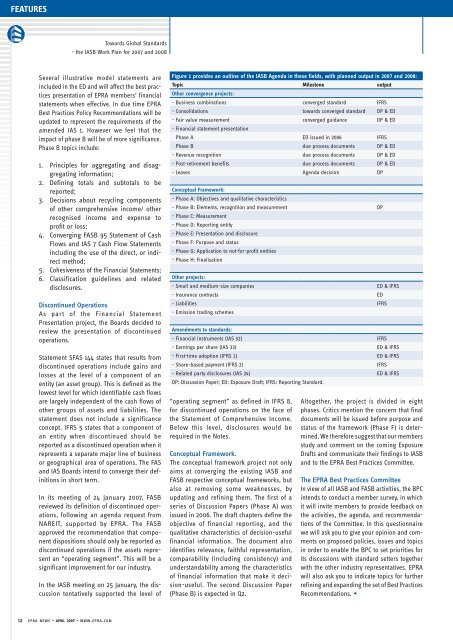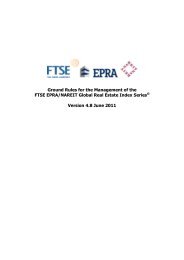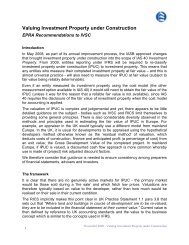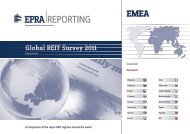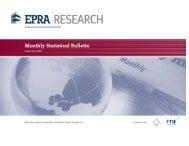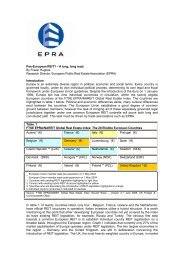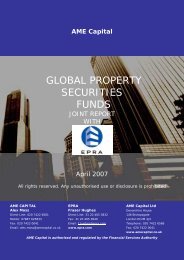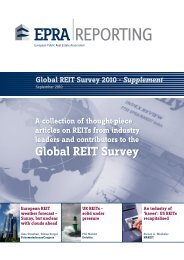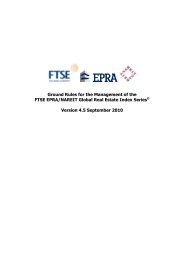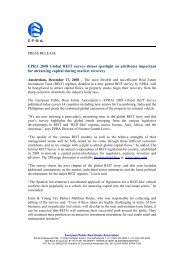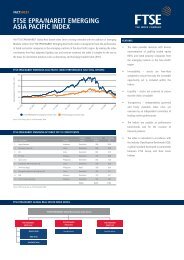communications policy nabarro nathanson reception iasb Work plan ...
communications policy nabarro nathanson reception iasb Work plan ...
communications policy nabarro nathanson reception iasb Work plan ...
Create successful ePaper yourself
Turn your PDF publications into a flip-book with our unique Google optimized e-Paper software.
features<br />
12 epra news - april 2007 - www.epra.com<br />
Towards Global Standards<br />
- the IASB <strong>Work</strong> Plan for 2007 and 2008<br />
Several illustrative model statements are<br />
included in the ED and will affect the best practices<br />
presentation of EPRA members’ financial<br />
statements when effective. In due time EPRA<br />
Best Practices Policy Recommendations will be<br />
updated to represent the requirements of the<br />
amended IAS 1. However we feel that the<br />
impact of phase B will be of more significance.<br />
Phase B topics include:<br />
1. Principles for aggregating and disaggregating<br />
information;<br />
2. Defining totals and subtotals to be<br />
reported;<br />
3. Decisions about recycling components<br />
of other comprehensive income/ other<br />
recognised income and expense to<br />
profit or loss;<br />
4. Converging FASB 95 Statement of Cash<br />
Flows and IAS 7 Cash Flow Statements<br />
including the use of the direct, or indirect<br />
method;<br />
5. Cohesiveness of the Financial Statements;<br />
6. Classification guidelines and related<br />
disclosures.<br />
Discontinued Operations<br />
As part of the Financial Statement<br />
Presentation project, the Boards decided to<br />
review the presentation of discontinued<br />
operations.<br />
Statement SFAS 144 states that results from<br />
discontinued operations include gains and<br />
losses at the level of a component of an<br />
entity (an asset group). This is defined as the<br />
lowest level for which identifiable cash flows<br />
are largely independent of the cash flows of<br />
other groups of assets and liabilities. The<br />
statement does not include a significance<br />
concept. IFRS 5 states that a component of<br />
an entity when discontinued should be<br />
reported as a discontinued operation when it<br />
represents a separate major line of business<br />
or geographical area of operations. The FAS<br />
and IAS Boards intend to converge their definitions<br />
in short term.<br />
In its meeting of 24 January 2007, FASB<br />
reviewed its definition of discontinued operations,<br />
following an agenda request from<br />
NAREIT, supported by EPRA. The FASB<br />
approved the recommendation that component<br />
dispositions should only be reported as<br />
discontinued operations if the assets represent<br />
an “operating segment”. This will be a<br />
significant improvement for our industry.<br />
In the IASB meeting on 25 January, the discussion<br />
tentatively supported the level of<br />
Figure 1 provides an outline of the IASB Agenda in these fields, with <strong>plan</strong>ned output in 2007 and 2008:<br />
Topic Milestone output<br />
Other convergence projects:<br />
- Business combinations converged standard IFRS<br />
- Consolidations towards converged standard DP & ED<br />
- Fair value measurement converged guidance DP & ED<br />
- Financial statement presentation<br />
Phase A ED issued in 2006 IFRS<br />
Phase B due process documents DP & ED<br />
- Revenue recognition due process documents DP & ED<br />
- Post-retirement benefits due process documents DP & ED<br />
- Leases Agenda decision DP<br />
Conceptual Framework:<br />
- Phase A: Objectives and qualitative characteristics<br />
- Phase B: Elements, recognition and measurement DP<br />
- Phase C: Measurement<br />
- Phase D: Reporting entity<br />
- Phase E: Presentation and disclosure<br />
- Phase F: Purpose and status<br />
- Phase G: Application to not-for-profit entities<br />
- Phase H: Finalisation<br />
Other projects:<br />
- Small and medium-size companies ED & IFRS<br />
- Insurance contracts ED<br />
- Liabilities IFRS<br />
- Emission trading schemes<br />
Amendments to standards:<br />
- Financial instruments (IAS 32) IFRS<br />
- Earnings per share (IAS 33) ED & IFRS<br />
- First-time adoption (IFRS 1) ED & IFRS<br />
- Share-based payment (IFRS 2) IFRS<br />
- Related party disclosures (IAS 24) ED & IFRS<br />
DP: Discussion Paper; ED: Exposure Draft; IFRS: Reporting Standard.<br />
“operating segment” as defined in IFRS 8,<br />
for discontinued operations on the face of<br />
the Statement of Comprehensive Income.<br />
Below this level, disclosures would be<br />
required in the Notes.<br />
conceptual Framework.<br />
The conceptual framework project not only<br />
aims at converging the existing IASB and<br />
FASB respective conceptual frameworks, but<br />
also at removing some weaknesses, by<br />
updating and refining them. The first of a<br />
series of Discussion Papers (Phase A) was<br />
issued in 2006. The draft chapters define the<br />
objective of financial reporting, and the<br />
qualitative characteristics of decision-useful<br />
financial information. The document also<br />
identifies relevance, faithful representation,<br />
comparability (including consistency) and<br />
understandability among the characteristics<br />
of financial information that make it decision-useful.<br />
The second Discussion Paper<br />
(Phase B) is expected in Q2.<br />
Altogether, the project is divided in eight<br />
phases. Critics mention the concern that final<br />
documents will be issued before purpose and<br />
status of the framework (Phase F) is determined.<br />
We therefore suggest that our members<br />
study and comment on the coming Exposure<br />
Drafts and communicate their findings to IASB<br />
and to the EPRA Best Practices Committee.<br />
The EPRA Best Practices committee<br />
In view of all IASB and FASB activities, the BPC<br />
intends to conduct a member survey, in which<br />
it will invite members to provide feedback on<br />
the activities, the agenda, and recommendations<br />
of the Committee. In this questionnaire<br />
we will ask you to give your opinion and comments<br />
on proposed policies, issues and topics<br />
in order to enable the BPC to set priorities for<br />
its discussions with standard setters together<br />
with the other industry representatives. EPRA<br />
will also ask you to indicate topics for further<br />
refining and expanding the set of Best Practices<br />
Recommendations. $


